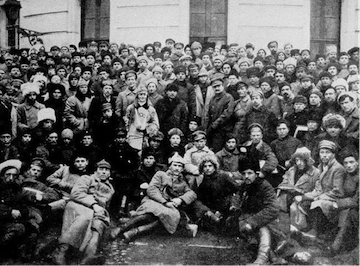

|
The Tenth Party Congress  Lenin, Voroshilov and Trotsky with participants of the Tenth Party Congress before the attack on the Kronstadt naval base This was the context in which the Tenth Party Congress assembled in Moscow on 8 March. Determined to the defeat the Workers' Opposition, Lenin got a vote condemning and then forced a secret resolution - one of the most fateful in the history of the Communist Party - banning factions in the party. Henceforth the Central Committee was to rule the party on the same dictatorial lines as the party ruled the country; no one could challenge its decisions without exposing themselves to the charge of factionalism. Stalin's rise to power was a product of the ban. No less monumental was the second historic resolution of the Tenth Party Congress, the replacement of food requisitioning by a tax in kind. This abandoned the central plank of War Communism and laid the foundations of the New Economic Policy (NEP) by allowing the peasants to sell their surplus on the free market once the tax was paid. Fearful that the delegates would denounce the tax as a restoration of capitalism, Lenin insisted that it was needed to quell the peasant uprisings (which were 'far more dangerous than all the Denikins, Yudeniches and Kolchaks put together') and build a new alliance with the peasantry. |
© 2014 Orlando Figes | All Rights Reserved